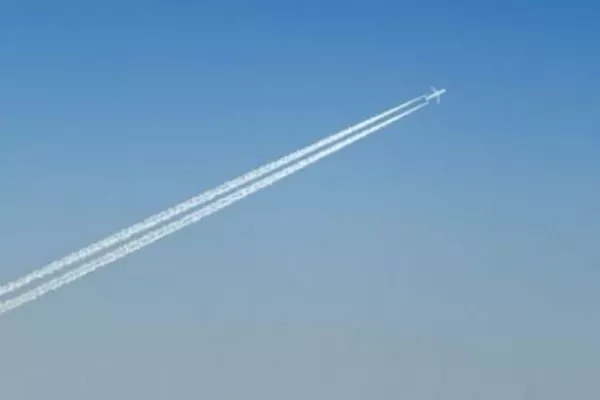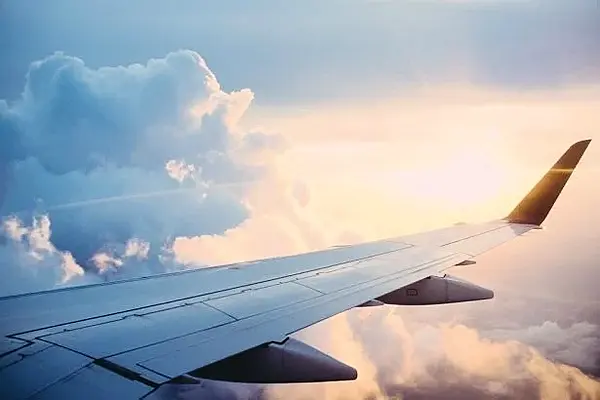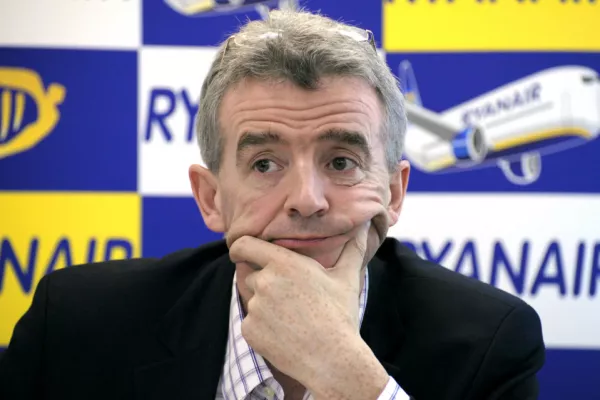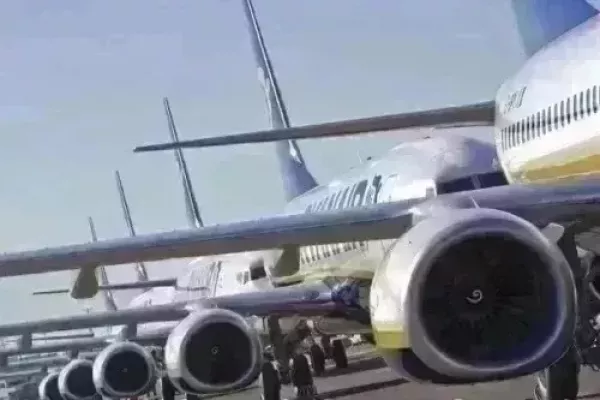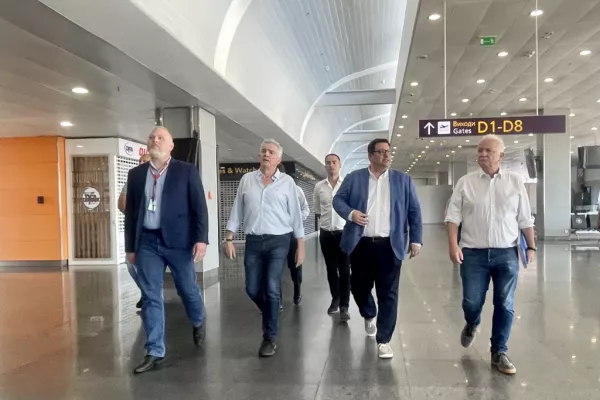Hospitality Ireland presents a round-up of the latest airline, aviation and travel news from around the world.
Singing And Dancing As South Africa's National Airline Returns To The Skies
Jubilant South African Airways (SAA) staff at the country's biggest airport broke into song and dance on Thursday September 23 as the airline took to the skies for the first time in around a year.
State-owned SAA's longstanding financial woes were exacerbated by the COVID-19 pandemic and it halted all operations last September when it ran out of funds. The company exited administration in April thanks to another massive government bailout.
It restarted domestic flights from Johannesburg to Cape Town on Thursday September 23 and next week will launch a slimmed-down international service to five African capitals: Accra, Kinshasa, Harare, Lusaka and Maputo.
"After so many months we've been waiting for this moment, I am so excited. I am over the moon," Mapula Ramatswi, an SAA flight attendant told Reuters at Johannesburg's OR Tambo International Airport.
"I'm actually emotional the fact that it's happening today, we never thought it would happen."
Ramatswi said the many months when SAA was grounded were difficult financially, but her family had helped her pull through.
Her colleagues sang church songs, ululated, clapped and danced nearby as an SAA plane with its tail fin bearing the colours of the South African flag took off.
The government has said it will sell a majority stake in SAA to a local consortium, and a due diligence process has been mostly completed. But the share purchase agreement has not yet been signed.
The planned sale of a 51% stake in SAA is part of government efforts to halt repeated bailouts to ailing state firms like SAA and power utility Eskom that have placed massive strain on stretched public finances.
El Al Raises Demands For State Aid; Appeals To Prime Minister
Israel's flag carrier El Al airlines said on Thursday September 23 that it requested $100 million in compensation from the government for its strict COVID-19 travel policies and asked the prime minister to help end a stalemate in bailout talks.
El Al was particularly vulnerable at the outbreak of the COVID-19 pandemic in early 2020. It has reported losses for three years and had racked up debt to renew its fleet.
The company's financial woes were compounded by travel limitations in Israel meant to prevent new outbreaks, and like many airlines around the world it turned to the state for help. It also has new ownership and management, which has been feuding over terms with the government for months.
El Al laid off 1,900 employees, nearly one-third of its staff, as part of a recovery plan mandated by the government to receive a $210 million aid package earlier in the year, and reduced its fleet to 29 from 45. But that, it has now said, was not enough.
"The Israeli aviation sector is perched above a slippery slope, and there is still doubt whether Israeli aviation companies can survive the crisis without government assistance," the CEOs of El Al and two small local rivals wrote to Prime Minister Naftali Bennett.
They asked him to help settle things in an emergency meeting.
In a separate letter to the director general of the Finance Ministry, EL Al CEO Avigal Soreq said his airline was "demanding immediate compensation for $100 million for damages caused to El Al due to decisions by the state."
Earlier in the month the Finance Ministry said it was ready to offer $50 million more in aid if its owners injected the same amount as part of a new aid framework. The ministry, in a statement on Thursday, said its position remains the same.
The airlines, in their letter, asked the prime minister to re-examine the Finance Ministry's demands of their owners. They also asked him to end some health restrictions that have hurt air travel, like mandatory quarantine for kids and vaccinated travellers.
Wizz Air Focussed On Organic Growth, Says Chief Supply Chain Officer
Hungary's Wizz Air is focussed on organic growth, its chief supply chain officer said, declining to comment on whether the low-cost airline had recently made a takeover approach for bigger rival easyJet .
"Our focus remains organic growth," chief supply chain and legal officer Owain Jones told the AirFinance Journal conference in London on Thursday September 23.
Sources have said Wizz was the suitor for easyJet after the British airline said earlier in September it had received an approach but did not name the bidder.
Jones said he could not comment on press speculation when asked if Wizz was behind the bid.
Wizz Air, which has grown rapidly over the last five years, expanding into western Europe from its eastern European base, has in the past said it wants to expand its presence at London's no.2 airport Gatwick, an easyJet stronghold.
Slots at Gatwick may be shortly available after British Airways said earlier on Thursday it was scrapping its short-haul operations from the airport.
"We remain as interested in Gatwick as we have been and as I've been saying and as (Wizz chief executive) Jo Varadi's been saying since the start of the pandemic," he said when asked whether Wizz would bid for the BA slots.
Europe's biggest low cost airline Ryanair has questioned whether Gatwick is the right place for low cost airlines, but Wizz said it could make Gatwick work.
"We'll only move to an airport if we're going to be operating at the right cost level," said Jones when asked about costs at Gatwick.
Industry sources have said that Wizz, which already has 240 aircraft on order, is in negotiations with European planemaker Airbus over the purchase of at least 100 more narrowbody jets, but Jones refused to be drawn on whether talks were underway.
"We'll continue to look at what's available in the market and what matches our growth aspirations," he said.
Delta Air Says Employee Vaccination Rate Against COVID-19 Has Risen To 82%
Delta Air Lines said on Thursday September 23 that its employee vaccination rate against COVID-19 had risen to 82%, weeks after announcing a monthly health insurance surcharge for unvaccinated workers.
The US airline last month said employees will have to pay $200 more every month for their company-sponsored healthcare plan if they choose to not be vaccinated against COVID-19. Delta said financial incentives such as an additional day of paid time off and $100 in health rewards, allowed it to vaccinate nearly 70% of its employees by June.
United Airlines on Wednesday September 23 said more than 97% of its US employees have been vaccinated ahead of the company's September 27 deadline for staff vaccination.
Airbus Sees LatAm Aviation Market At Pre-Pandemic Levels By 2024
The aviation market in Latin America and the Caribbean should by early 2024 recover to the size it was before the coronavirus pandemic, Arturo Barreira, regional chief of European aircraft maker Airbus, said on Thursday September 24.
Travel restrictions imposed during the COVID-19 health emergency hit civil aviation hard last year, before a gradual recovery began to set in.
"What we're seeing are different speeds of recovery," Barreira told Reuters in an interview. "Obviously the domestic market and tourism are leading the way, while the long distance and business markets will take longer."
Overall, the market would be back at pre-pandemic levels by roughly 2023 or early 2024, he said.
The executive said regional improvement would be driven mainly in Mexico by a strong showing by low-cost airlines VivaAerobus and Volaris, two Airbus clients.
Between January and July, Mexican airlines transported 28.6 million passengers, a jump of over 50% from the same period last year, official data showed. But that was still well below the 40.4 million travelers logged in the same period in 2019.
Barreira said during 2021, Airbus has so far delivered 25 aircraft to the region's airlines, two fewer than in all of 2020. The planemaker expects to sell more than 27 aircraft this year, but Barreira declined to say how many exactly.
Nearly 700 Airbus aircraft currently operate in Latin America and the Caribbean, or 60% of the fleet in service.
Carnival Says Cruise Bookings For 2022 Second Half Are Above Pre-Pandemic Levels
Carnival Corp said on Friday September 24 that cruise bookings for the second half of 2022 were ahead of pre-pandemic levels, in a sign the cruise operator expects a rebound in business as it restarts voyages globally.
The company's US-listed shares rose 3.1% to $25.48 as the Cunard cruise line owner said its core earnings will break even early next year and be above pre-pandemic levels in 2023.
The cruise sector was among those most affected by the pandemic in 2020 as many ships docked at ports and anchored offshore for months, forcing operators to raise billions of dollars in debt to stay afloat.
Cruise enthusiasts are looking forward to the resumption of more voyages from US ports after the country's health officials gave the green light earlier this year to restart sailings.
Eight of Carnival's nine brands have resumed sailings, and it expects more than half its total fleet capacity to be open for guests by the end of October.
"We're planning to have the full fleet on in time for the summer season where we make the bulk of our profits," CEO Arnold Donald said.
Carnival said its voyages for the third quarter were cash flow positive, as people spent more at bars, casinos and spas on board, adding that it expects the cash flow trend to continue.
The company said its booking trends have seen an uptick in recent weeks after demand for near-term sailings last month took a hit due to the Delta variant of the coronavirus.
Norwegian Cruise Line Holdings Ltd and Royal Caribbean Group have also pointed to strong booking trends for next year's cruises.
However, Carnival expects its fourth-quarter monthly average cash burn rate to be higher than the $510 million during the third quarter.
The company's quarterly adjusted loss widened to $1.99 billion from $1.70 billion a year earlier.
Delta Sees Place For Boeing's 737 MAX Jet In Its Fleet - Airline Weekly
Delta Air Lines sees a place for Boeing's 737 Max airplane at the carrier as it looks to reshape its fleet over the next decade, Airline Weekly reported on Thursday September 23, citing comments by Delta's chief executive.
"No news to report we're constantly talking to," Airline Weekly quoted Delta Chief Executive Ed Bastian as saying in a webinar on September 20. "There's certainly a place for [the Max] if we can figure out how to bring them in."
Any Boeing 737 MAX order would be the first for Delta, which did not have the aircraft in its fleet when the plane was grounded in March 2019 following two fatal crashes. It would also be the first major Boeing order for Delta in a decade.
The story, however, did not say that if there were any purchase orders on the horizon.
A Delta spokesperson declined to confirm Bastian's comments and said the airline has no fleet announcements to make.
Boeing did not respond to a request for comment.
Reuters reported last October that Boeing had discussions with Delta to take 40 of the 737 MAX jets.
In the webinar, Bastian said Delta was also looking to acquire more Airbus A220 and A350 aircraft, Airline Weekly reported.
Airbus did not respond to a Reuters' request for comments.
Oman Air Seeks Oneworld Alliance Membership
State-owned Oman Air announced on Sunday September 26 its intention to apply to join the oneworld global airline alliance and said it had asked fellow Gulf carrier and member Qatar Airways to help it.
Oman Air said it had approached Qatar Airways, whose chief executive Akbar Al Baker is the chairman of the airline group, for guidance in making its application.
"As the industry recovers from COVID, airline alliances are going to be more important than ever," the airline said in an e-mailed statement to Reuters.
"This will provide us with excellent global connectivity, a seamless travel experience and more valuable loyalty offerings for our guests."
A oneworld spokesman said the alliance was at any time in talks with prospective members but that it did not comment on specific airlines.
"As airlines recover from COVID-19, alliances will become more important by providing global connectivity, as airlines reshape their networks, many with reduced fleets when compared to their pre-COVID size," the onewolrd spokesman said.
A Qatar Airways spokesperson earlier referred comment to oneworld.
There are 14 airlines in the oneworld alliance, including Qantas, American Airlines and British Airways.
Qatar Airways holds direct and indirect stakes in three oneworld members, including British Airways and Cathay Pacific.
Oman Air flies to 34 destinations, which it says will increase to 44 next year. It has 47 aircraft in its fleet with 32 jets in operation.
HNA Tells Creditors It Will Receive $5.9bn In Strategic Investment
China's HNA Group will receive strategic investment of 38 billion yuan ($5.88 billion) after its restructuring, which will go to eleven of its entities including its flagship carrier Hainan Airlines, two sources told Reuters on Monday September 27.
Gu Gang, the group's party secretary and leader of the government-led working group addressing HNA's liquidity issues, disclosed the investment at a meeting of its creditors, the two sources who were familiar with the meeting's discussions said.
He did not elaborate on where the investment was coming from but said about 25 billion yuan of the strategic investment would go to Hainan Airlines to replenish its cashflow, they said, asking not to be named because they were not authorised to speak to the press.
Reuters reported earlier that the meeting was planned for Monday and that HNA would reorganise the 11 entities as one group.
HNA did not immediately reply to a request for comment.
Hainan Airlines said in a separate statement on Monday September 27 that it would use funds from strategic investors and future operating income to repay the debts of the airline and of the other 10 entities.
In the 2010s, HNA used a $50 billion global acquisition spree, mainly fuelled by debt, to build an empire with stakes in businesses from Deutsche Bank to Hilton Worldwide.
But its spending drew scrutiny from the Chinese government and overseas regulators. As concerns grew over its mounting debts, it sold assets such as airport services company Swissport and electronics distributors Ingram Micro to focus on its airline and tourism businesses.
HNA was placed in bankruptcy administration in February and a working group created by the government of its home province of Hainan has been addressing the company's liquidity problems.
Late on Friday September 24, the company said that its chairman and chief executive had been detained by Chinese police over suspected criminal offences.
Gu also told Monday September 27's meeting that Hainan Airlines had worked out a debt restructuring plan with major domestic and overseas aircraft lessors, which had given substantial exemptions on its debts, the sources said.
Hainan Airlines' interest-bearing liabilities will fall to 60 billion yuan after the reorganisation, its total assets will stand at 170 billion yuan and its debt ratio will lower to 81% after the debts are cleared, they said.
A document detailing HNA's restructuring plan had said that creditors of the 11 entities have reported that they are owed 397.2 billion yuan ($61.43 billion) of unpaid debt. Only 161.29 billion yuan of this has been recognised by the court and will enter the restructuring process.
Unsecured creditors that are owed no more than 100,000 yuan ($15,465.01) in principal debt will be repaid in full. Any debt above that level will be paid partly by HNA and other parties, and partly in Hainan Airlines' shares, according to a document seen by Reuters.
The creditors' committee still must approve the plan, the document said.
US Export Tightening Slows Advance Of Chinese C919 Jet - Sources
China's C919 jetliner - a no-show at the country's biggest air show this week - has found it harder to meet certification and production targets amid tough US export rules, according to three people with knowledge of the programme.
The state-owned manufacturer, Commercial Aircraft Corp of China (COMAC), has been unable to get timely help from suppliers and has run out of some spare parts, those people said.
As of December 2020, the US has required special licenses to export parts and technology assistance to any company with ties to the Chinese military. That has thrown a monkey wrench into the C919 programme, which has been in development for 13 years - one of the longest such periods in aviation.
US-linked suppliers are gradually receiving the licences, but the hiccup has slowed down Chinese certification, and months-long delays threaten to affect early production, said the people, who declined to be named because of the sensitivity of the matter.
COMAC has 815 provisional orders, but only China Eastern Airlines placed a firm order for five jets.
The state-backed airline said in August it expects to receive its first C919 by the end of the year, two in 2022 and two more in 2023.
A slow production rampup would mean the C919 will not pose a near-term threat to Airbus and Boeing, which produce dozens of narrowbodies a month.
"One of the biggest hurdles is going to be the supply chain, especially now with inflation, material availability and supplier changes," said aerospace supply chain expert Alex Krutz at U.S-based aerospace consultancy Patriot Industrial Partners.
"The suppliers may not have the liquidity to make the post-certification changes or be willing as they were a few years ago to continue supporting an initial lower-rate production programme like COMAC," he added.
COMAC is years behind its initial certification schedule - one reason it did not take the C919 to the China Airshow.
"COMAC are very preoccupied with test flights. They're behind schedule and are flying as much as they can to reach the minimum hours needed for Chinese certification," an industry source told Reuters. "Despite all the issues, COMAC is very determined to get certified, as this is a paramount political task."
Sources say that the C919 is likely to receive its type certificate from China's aviation regulator by the end of this year, but that there will be a long list of limits on flight operations. Even after the certification, COMAC must make upgrades, the sources said.
COMAC and the Civil Aviation Administration of China (CAAC) did not respond to requests to comment.
The sources with knowledge of the C919 programme said the jet's progress seemed to mirror the certification pattern and slow production of its predecessor, the ARJ21 regional jet.
The ARJ21 faced a 2.5-year gap between obtaining a "type certificate", which declares the design safe, and a "production certificate" allowing it to enter mass production.
That contrasts with the West, where those certificates are typically granted around the same time.
Approximately 60 ARJ21 aircraft have been delivered to date, but the production ramp-up was also slow, rising from two planes a year in 2017 to 24 in 2020, according to COMAC data.
The C919 is in a phase called "batch production", where each plane requires a sign-off by the regulator.
The C919 is assembled in China but relies heavily on Western components, including engines and avionics. That has made it vulnerable to crackdowns on key technology transfers.
The addition of two key COMAC subsidiaries to a list of companies with military ties in December 2020 created bureaucratic licensing requirements.
China has been doubling down on developing its own engine for the C919; state engine maker Aero Engine Corporation of China (AECC) will display a model of the CJ-1000 engine at the air show, but the domestic solution for the airliner is years away.
AECC is spending 10 billion yuan ($1.55 billion) to build an industrial complex in the southwestern city of Chengdu to manufacture engine nacelles and thrust reversers, local media reported last month. A source with knowledge of the matter said the complex related to CJ-1000 production.
The nacelle capacity is expected to reach 100 per year, enough for 50 planes, the reports said, though no target date was stated. AECC did not respond immediately to a request for comment.
News by Reuters, edited by Hospitality Ireland. Click subscribe to sign up for the Hospitality Ireland print edition.
